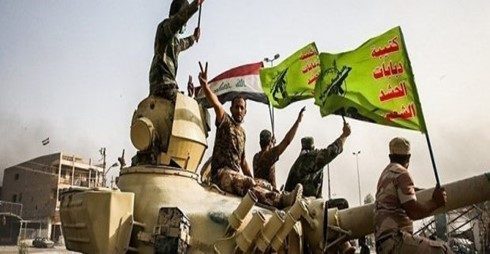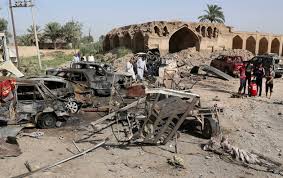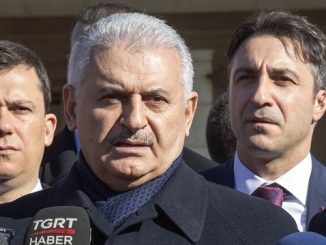
Amnesty International has called on Iraq to reveal the whereabouts of 643 Sunni men and young boys who were kidnapped by the pro-Iran Popular Mobilization Forces (PMF) during operations to retake Fallujah city from Daesh in 2016.
The men and teenagers disappeared during an operation by Hashd al-Shaabi in 2016 to retake Fallujah from the Islamic State group. Also, Human Rights Watch said the Hashd al-Shaabi paramilitary was likely behind eight incidents of forced disappearances between December 2019 and October 2020
Amnesty International has called on Iraqi authorities to reveal the whereabouts of at least 643 men and boys who had been abducted by Shia paramilitaries in the fight against the Islamic State (IS) group.
The men and teenagers disappeared during an operation by Hashd al-Shaabi in June 2016 to retake Fallujah in the western desert from IS.
The rights watchdog quoted witnesses as saying that on 3 June, while thousands of men, women and children were fleeing the Anbar region, they were met by a group of armed men wearing PMF uniforms. They “took an estimated 1,300 men and boys considered to be of fighting age away from their families.”
“At sunset, at least 643 men and boys were boarded onto buses and a large truck. Their fate remains unknown” while the rest alleged they were tortured, the human rights watchdog said in a statement.
Then Prime Minister Haider Al-Abadi established a committee to investigate the disappearances and abuses two days later but “the committee’s findings have never been made public”, according to Amnesty.
“For five years, the families of these men and boys have been living in anguish, not knowing the fate of their loved ones, or whether they are even alive. Young boys were ripped away from their parents and entire families torn apart. The families deserve to know what happened to their loved ones. They deserve an end to their suffering,” the statement quoted Lynn Maalouf, deputy director for the Middle East and North Africa at Amnesty International, as saying.
“The Iraqi authorities must end this anguish and reveal the fate and whereabouts of those forcibly disappeared by the PMU [PMF]. We also urge the authorities to publicly disclose the findings of their official investigation and hold those responsible to account,” she added.
“Young boys were ripped away from their parents and entire families torn apart. The families deserve to know what happened to their loved ones. They deserve an end to their suffering.”
Days after the disappearance, Baghdad’s then-Prime Minister, Haider al-Abadi, set up a committee that would investigate reports of disappearances and abuses during the military operations to retake Fallujah from IS.
Amnesty said that the “committee’s findings have never been made public”.
Human Rights Watch reported eight incidents of forced disappearances between December 2019 and October 2020, and said that the Hashd al-Shaabi paramilitary was likely behind all of them.
In a petition signed by 30 human rights organizations last year, the groups said that “Iraq has become one of the largest countries that have missing persons in the world”.
Since taking office in 2020, Iraqi Prime Minister Mustafa al-Kadhimi announced his government would be creating a new mechanism for locating victims of forced disappearances, but rights groups have criticized authorities for not following through.
Kadhimi has also been criticized for not holding those accountable for a spike in targeted killings of prominent activists and journalists.
The Amnesty report read:
On the fifth anniversary of the enforced disappearance of at least 643 Iraqi men and boys by Popular Mobilization Unit (PMU) militias during military operations to retake control of Fallujah from the so-called Islamic State group, Lynn Maalouf, Deputy Director for the Middle East and North Africa at Amnesty International said:
“For five years, the families of these men and boys have been living in anguish, not knowing the fate of their loved ones, or whether they are even alive. Young boys were ripped away from their parents and entire families torn apart. The families deserve to know what happened to their loved ones. They deserve an end to their suffering.
“To date, the Iraqi authorities have never publicly revealed the outcome of an investigation into disappearances and abuses committed during the retaking of Fallujah, leaving families in a perpetual state of limbo.
“The Iraqi authorities must end this anguish and reveal the fate and whereabouts of those forcibly disappeared by the PMU. We also urge the authorities to publicly disclose the findings of their official investigation and hold those responsible to account.”
Background
On the morning of 3 June 2016, thousands of men, women and children fleeing the area of Saqlawiya in the Anbar region were met by a group of men armed with machine guns and assault rifles. Witnesses identified the armed men as members of the PMU based on emblems on their uniforms and flags. The armed men took an estimated 1,300 men and boys considered to be of fighting age away from their families. At sunset, at least 643 men and boys were boarded onto buses and a large truck. Their fate remains unknown. The remaining men were taken to what survivors described as the “yellow house”, where they reported being tortured and subjected to other ill-treatment.
On 5 June 2016, the Office of Iraq’s then-Prime Minister, Haider al-Abadi, set up a committee to investigate disappearances and abuses committed in the context of military operations to retake Fallujah. The committee’s findings have never been made public. The Iraqi authorities did not respond to Amnesty International’s request for information at the time.
The PMU are comprised of large, well-established militia groups and are legally considered part of the Iraqi Armed Forces.



